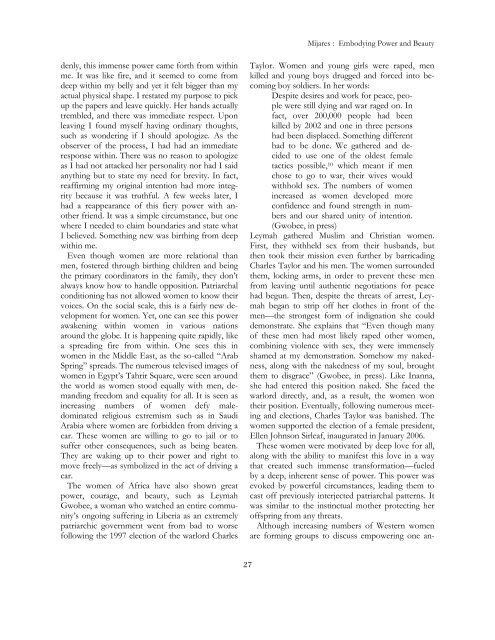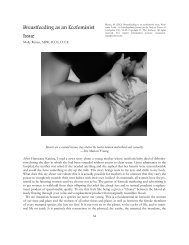RE:IJSNC, Issue 1, Volume 2, May 2012 - Ocean Seminary College
RE:IJSNC, Issue 1, Volume 2, May 2012 - Ocean Seminary College
RE:IJSNC, Issue 1, Volume 2, May 2012 - Ocean Seminary College
Create successful ePaper yourself
Turn your PDF publications into a flip-book with our unique Google optimized e-Paper software.
denly, this immense power came forth from within<br />
me. It was like fire, and it seemed to come from<br />
deep within my belly and yet it felt bigger than my<br />
actual physical shape. I restated my purpose to pick<br />
up the papers and leave quickly. Her hands actually<br />
trembled, and there was immediate respect. Upon<br />
leaving I found myself having ordinary thoughts,<br />
such as wondering if I should apologize. As the<br />
observer of the process, I had had an immediate<br />
response within. There was no reason to apologize<br />
as I had not attacked her personality nor had I said<br />
anything but to state my need for brevity. In fact,<br />
reaffirming my original intention had more integrity<br />
because it was truthful. A few weeks later, I<br />
had a reappearance of this fiery power with another<br />
friend. It was a simple circumstance, but one<br />
where I needed to claim boundaries and state what<br />
I believed. Something new was birthing from deep<br />
within me.<br />
Even though women are more relational than<br />
men, fostered through birthing children and being<br />
the primary coordinators in the family, they don’t<br />
always know how to handle opposition. Patriarchal<br />
conditioning has not allowed women to know their<br />
voices. On the social scale, this is a fairly new development<br />
for women. Yet, one can see this power<br />
awakening within women in various nations<br />
around the globe. It is happening quite rapidly, like<br />
a spreading fire from within. One sees this in<br />
women in the Middle East, as the so-called “Arab<br />
Spring” spreads. The numerous televised images of<br />
women in Egypt’s Tahrir Square, were seen around<br />
the world as women stood equally with men, demanding<br />
freedom and equality for all. It is seen as<br />
increasing numbers of women defy maledominated<br />
religious extremism such as in Saudi<br />
Arabia where women are forbidden from driving a<br />
car. These women are willing to go to jail or to<br />
suffer other consequences, such as being beaten.<br />
They are waking up to their power and right to<br />
move freely—as symbolized in the act of driving a<br />
car.<br />
The women of Africa have also shown great<br />
power, courage, and beauty, such as Leymah<br />
Gwobee, a woman who watched an entire community’s<br />
ongoing suffering in Liberia as an extremely<br />
patriarchic government went from bad to worse<br />
following the 1997 election of the warlord Charles<br />
27<br />
Mijares : Embodying Power and Beauty<br />
Taylor. Women and young girls were raped, men<br />
killed and young boys drugged and forced into becoming<br />
boy soldiers. In her words:<br />
Despite desires and work for peace, people<br />
were still dying and war raged on. In<br />
fact, over 200,000 people had been<br />
killed by 2002 and one in three persons<br />
had been displaced. Something different<br />
had to be done. We gathered and decided<br />
to use one of the oldest female<br />
tactics possible, 10 which meant if men<br />
chose to go to war, their wives would<br />
withhold sex. The numbers of women<br />
increased as women developed more<br />
confidence and found strength in numbers<br />
and our shared unity of intention.<br />
(Gwobee, in press)<br />
Leymah gathered Muslim and Christian women.<br />
First, they withheld sex from their husbands, but<br />
then took their mission even further by barricading<br />
Charles Taylor and his men. The women surrounded<br />
them, locking arms, in order to prevent these men<br />
from leaving until authentic negotiations for peace<br />
had begun. Then, despite the threats of arrest, Leymah<br />
began to strip off her clothes in front of the<br />
men—the strongest form of indignation she could<br />
demonstrate. She explains that “Even though many<br />
of these men had most likely raped other women,<br />
combining violence with sex, they were immensely<br />
shamed at my demonstration. Somehow my nakedness,<br />
along with the nakedness of my soul, brought<br />
them to disgrace” (Gwobee, in press). Like Inanna,<br />
she had entered this position naked. She faced the<br />
warlord directly, and, as a result, the women won<br />
their position. Eventually, following numerous meeting<br />
and elections, Charles Taylor was banished. The<br />
women supported the election of a female president,<br />
Ellen Johnson Sirleaf, inaugurated in January 2006.<br />
These women were motivated by deep love for all,<br />
along with the ability to manifest this love in a way<br />
that created such immense transformation—fueled<br />
by a deep, inherent sense of power. This power was<br />
evoked by powerful circumstances, leading them to<br />
cast off previously interjected patriarchal patterns. It<br />
was similar to the instinctual mother protecting her<br />
offspring from any threats.<br />
Although increasing numbers of Western women<br />
are forming groups to discuss empowering one an-



